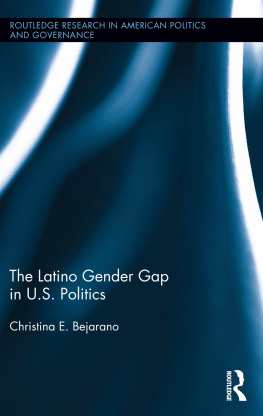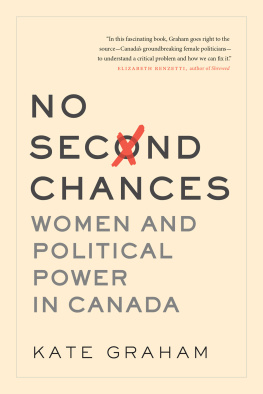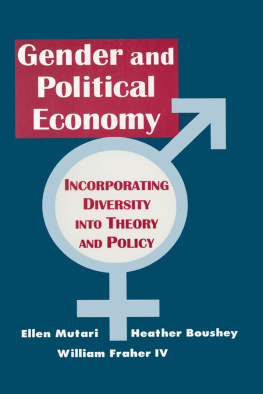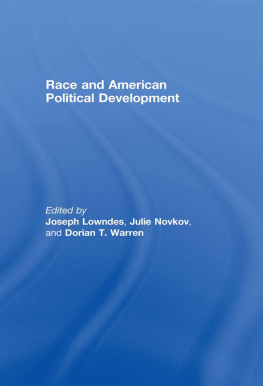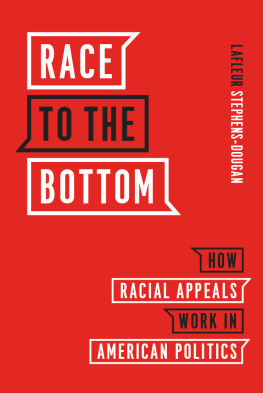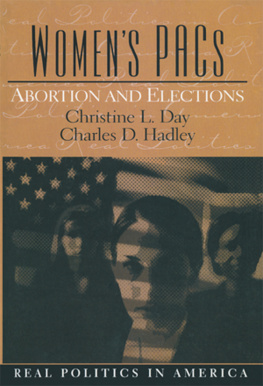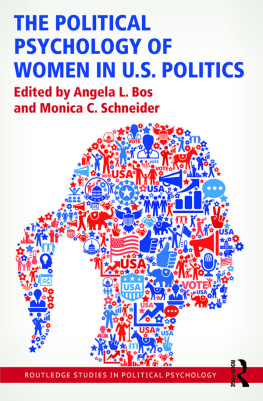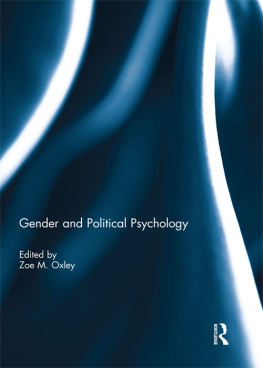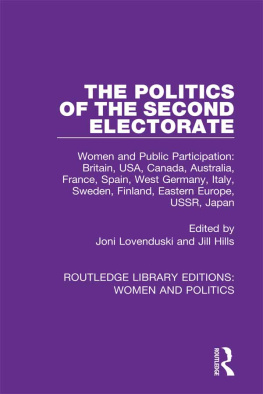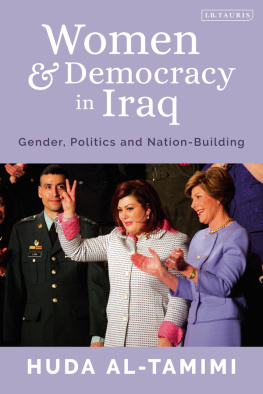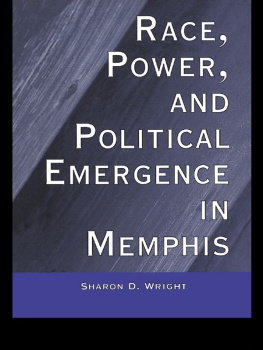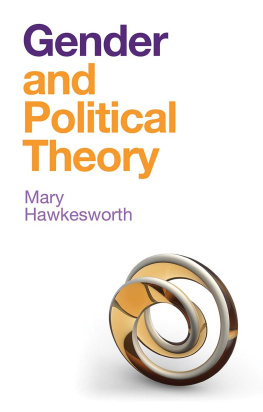The Latina Advantage
Gender, Race, and Political Success
CHRISTINA E. BEJARANO

University of Texas Press
Austin
Copyright 2013 by the University of Texas Press
All rights reserved
First edition, 2013
Requests for permission to reproduce material from this work should be sent to:
Permissions
University of Texas Press
P.O. Box 7819
Austin, TX 78713-7819
http://utpress.utexas.edu/index.php/rp-form
Library of Congress Cataloging-in-Publication Data
Bejarano, Christina E., 1980
The Latina advantage : gender, race, and political success / Christina E. Bejarano.
p. cm.
Includes bibliographical references and index.
ISBN 978-0-292-74564-3 (cloth : alk. paper)
1. Women legislatorsUnited States. 2. Latin AmericansUnited States. I. Title.
HQ1236.5.U6B46 2013
305.868073dc23
2012042768
doi:10.7560/745643
ISBN 978-0-292-74565-0 (library e-book)
ISBN 978-0-292-74566-7 (individual e-book)
I dedicate this work to my family, for their continued support and love: my parents, Benita and Ramon Bejarano, my brother, Chris, and sister-in-law, Jessica Bejarano. Without their constant encouragement, I would not have been able to finish this book or achieve my goals. I am grateful for the strong and wise Latinas who have blessed my life and inspired my work: Benita Bejarano, Jennie Sagaribay, Ramona Hernandez, Sonya Arenivar, and Crystal Alba.
Do not go where the path may lead;
go instead where there is no path and leave a trail.
RALPH WALDO EMERSON
Contents
Acknowledgments
I would like to thank Gary Segura for continuing to serve as an invaluable advisor to me since graduate school. I am thankful for Valerie Martinez-Ebers, who has always encouraged me to pursue my goals as a scholar. I express thanks to the University of Iowa faculty who served on my dissertation committee: Douglas Dion, David Redlawsk, Vicki Hesli, Maria Vlez, and Aimee Carrillo Rowe. I am grateful to Rene Rocha, Holley Hansen, and Stephen Nemeth for their help and support during my dissertation-writing time at the University of Iowa.
I gratefully acknowledge the financial support I received from the University of Iowa and the University of Kansas. I thank Trisha Blunt for her research assistance with one of the chapters. I am appreciative of my fellow University of Kansas faculty members, and I am especially grateful for the support and advice of Alesha Doan, Hannah Britton, Don Haider-Markel, Brent Steele, and Jessica Vasquez, who were helpful early in the book process. I thank Kira Sanbonmatsu for providing valuable feedback early in the book proposal stage.
I also thank the anonymous reviewers and my editor, Theresa May, for their constructive help with this project.
INTRODUCTION
Challenges to the Double Disadvantage Theory
The political landscape of the 2008 presidential election, with Barack Obama and Hillary Rodham Clinton as major party candidates for president, highlighted a number of important issues concerning the impact of race and gender. Questions arose regarding the predicted level of voter support for women and racial/ethnic-minority political candidates. Would a black or a female presidential candidate be electable in the United States? How does identity impact the level of support for diverse political candidates? This book intends to make a contribution to the political debate on these topics.
As the electoral environment becomes more diverse, researchers are challenged to answer questions involving the influence of both gender and racial/ethnic identity. Is the public swayed by a politicians race/ethnicity or gender as they decide whom to support? Further, how does the interaction of race/ethnicity and gender influence peoples decisions as they assess diverse politicians? How do demographic traits contribute to the continued underrepresentation of both minorities and women?
Minority women, as both women and members of a minority racial/ethnic group, may be treated according to both gender stereotypes and racial stereotypes and expectations. This combination of gender effects and racial effects can pose additional challenges for minority women in their attempt to reach electoral parity. Earlier work on minority women used a double jeopardy (Beale 1979) or multiple jeopardy (King 1988) approach to argue that various disadvantages can accumulate and produce distinctive forms of oppression. In line with this, previous work (Carroll and Strimling 1983; Epstein 1973; Githens and Prestage 1977) offered a double disadvantage hypothesis, which states that minority women will suffer politically from being women and from being a minority (Darcy, Hadley, and Kirksey 1997). This early research relied on evidence that black women are less well represented than women generally or blacks generally, which appears to confirm the double disadvantage hypothesis: black women suffer politically from being women and from being black (Darcy et al. 1997:448).
There is more recent evidence that demonstrates that black women have made greater gains than white women within their respective electoral environments (Darcy and Hadley 1988; Moncrief, Thompson, and Schuhmann 1991). Research conducted in the late 1990s and early 2000s on Latina elected officials (Montoya, Hardy-Fanta, and Garcia 2000; Takash 1993; Hardy-Fanta 1993), suggested that Latinas are elected at higher rates than their male counterparts (Garca Bedolla, Tate, and Wong 2005:167). This evidence sparked debate over whether there are possible overrepresentations of minority female legislators in their respective minority delegations in the U.S. Congress, as compared to white females in their delegations.
This debate includes the question of whether minority women legislators are uniquely positioned to benefit in the legislative process from the intersectionality of their ethnicity and gender, which Fraga et al. (2005) define as their strategic intersectionality. I offer a unique contribution to the literature, by proposing a complimentary theory that explains how minority women political candidates, more specifically Latinas, can gain potential electoral advantages from the intersection of their gender and race/ethnicity. I argue and present evidence that counters the theory of double jeopardy or additive electoral disadvantages for minority women. Minority females encounter a positive interaction of their gender and race/ethnicity that results in fewer electoral disadvantages. As a result, they perform better electorally than minority men among some key voters. This interactive dynamic can help explain the dramatic electoral success of minority females in electoral politics in the last ten years.
Political Phenomenon for Latinas
Evidence of Latinas potential diminished political disadvantages can be seen by examining the current representation of racial/ethnic-minority women in elective office compared to their male counterparts. As of 2005, women of color at the state and national levels made up a larger proportion of their minority delegation, compared to their respective minority male counterparts, than white women compared with their white male counterparts (Garca Bedolla et al. 2005:166). Racial/ethnic-minority women currently account for a greater share of minority political representatives than white women do of white elected officials, in both the U.S. Congress and state legislatures.
In the 108th Congress (20032005), Latinas made up 29 percent of the Latino membership, black women made up 33 percent of the black membership, and Asian American females made up 29 percent of the Asian American membership (19891991) (Garca Bedolla et al. 2005:166). By contrast, white women were only 57 out of 463 total white representatives, or 12 percent of the white membership.
Next page

